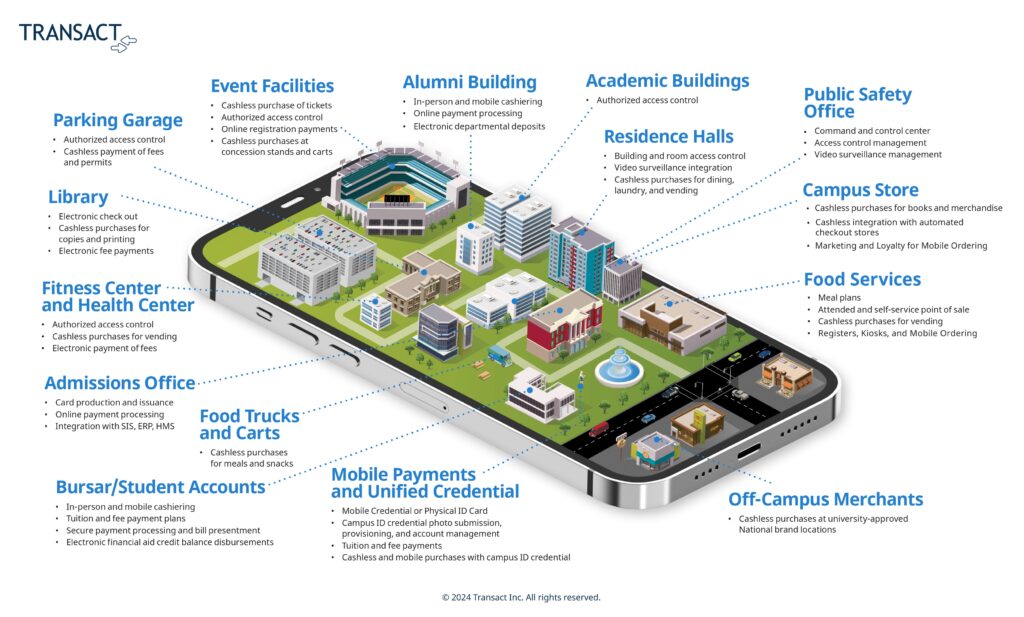[ad_1]
Fintechs are studying that school campuses and the Era Z college students on them are beneficial markets with distinctive ecosystems. The paths of two, Transact Campus and Frich, are fashions for firms searching for to entrench themselves in academia.
In contrast to Frich, Transact Campus has been round for almost 40 years. CEO Nancy Langer mentioned Transact Campus has three traces, starting with a cost platform that manages $53 billion yearly in tuition and room and board funds. The second is identification software program that organizes credentials for constructing entry, meal administration and different providers. Transact Campus additionally operates a commerce system together with cell ordering, eating transactions and entry for third-party manufacturers. Roughly 1,500 of the corporate’s 2,000 are greater training establishments.
Leveraging campus-wide knowledge to offer an optimum expertise
Langer mentioned Transact Campus’ worth proposition is delivering an optimum pupil expertise. Which means cell, real-time and textual content messages (no e-mail) throughout most campus touchpoints.
“That’s the holy grail for our purchasers,” Langer mentioned. “They wish to, via a cell expertise delivered to college students, present every thing they want, in a contemporary expertise: environment friendly, real-time and handy.”

These many touchpoints generate 20 totally different knowledge sources that Transact Campus makes use of to assist establishments drive enrolment and retain college students, a rising concern as inhabitants progress slows and registrations decline. It additionally exhibits what college students need from their expertise past post-graduate employment.
They need a linked expertise, with straightforward communication of their most popular codecs. They wish to be part of teams. Cost choices are a necessary retention software, with totally different plans out there to assist preserve college students in school.
The place it’s headed
Quickly evolving know-how means preferences change simply as rapidly. Whether or not they eat within the eating corridor, college students need cell ordering. Transact Campus enhances the expertise by integrating Amazon Stroll Out.
“The place it’s shifting is contactless,” Langer defined. “For the college, there’s much less labor wanted on the level of sale. It makes {that a} seamless expertise for college students who simply order, choose up, and go. That goes to the effectivity (universities) must drive their budgets as they proceed to be lower or held agency.”
Monetary establishments understand the treasure trove Transact Campus has on a key inhabitants phase on the verge of being an financial power. What are their cost preferences? Favourite actions? Langer’s advertising and marketing crew helps fiservs attain Era Z.
Advertising should be social but customized. Attain Era Z with quick movies that stick. Don’t inundate them with repeated pushes.
The financial advantages lengthen to the encompassing campus communities, which, in small cities, rely on college students to outlive. Transact Campus helps program companions market to these companies so college students can use saved worth on their accounts to transact simply off campus.
Cell credentials, proactively stopping dropouts – What’s subsequent
Langer sees sturdy potential in cell credentials, that are less complicated to keep up than bodily methods. The advantages lengthen to alumni, booster golf equipment and company-sponsored employees training plans.
“That’s traditionally been a really tough course of to handle, as it’s not automated,” Langer defined. “We rolled out a platform for that and for the faculties.
“Why that issues is driving greater enrolment, as a result of many firms and authorities entities get annoyed with that course of. We additionally suppose that platform can be utilized for some non-public scholarships and issues college students use.”
The school expertise is quickly turning into a contactless and unattended one. Order your meals on the way in which to the corridor, seize it, and stroll out. Transact Campus is integrating Amazon Stroll Out and related applied sciences. Langer says it’s the wave of the (close to) future.
Past the cost comfort is the chance to be taught what causes college students to drop out and stop it earlier than it occurs. Transact Campus works with establishments to interpret that knowledge to achieve college students earlier than they attain a disaster level. The system will probably be absolutely operational by the tip of 2024. Dynamic menus the place knowledge is used to find out dietary preferences are being studied.
Frich helps fiservs perceive Era Z
Katrin Kaurov bought a crash course in private monetary administration from a modelling profession that noticed her dwell and work in 20 international locations between the ages of 14 and 22. She channelled that have into Frich, a New York Metropolis-based fintech backed by Mastercard, Goodwater Capital, Monetary Enterprise Studio and Antler.
Frich makes cash a social matter. It permits Era Z to anonymously examine themselves to their friends in all areas monetary, serving to them make fast selections to enhance their monetary future. By assessing themselves in opposition to carefully related teams (Michigan State sophomores), Era Z will get a transparent image of their monetary well being and takes steps to enhance it. How a lot do they spend on social actions in comparison with their friends? Is their lease too excessive?
“There’s so little on the market that understands how totally different Era Z is from different generations,” Kaurov started.
They grew up via two monetary crises and haven’t forgotten how banks pushed debt, even on campus. There’s no personalization – they’re merely commodities. Overseas-born Gen Z’ers, regardless of their backgrounds, wrestle even to get a bank card.
There’s a large alternative for credit score unions and group banks. Kaurov mentioned solely 6% of Era Z trusts conventional establishments. Her monetary journey led her to credit score unions and group banks, which she mentioned are well-aligned to this rising financial power.
“They’re vision- and mission-driven and customized; they really care about their members over income,” Kaurov mentioned. “Gen Z’ers don’t know something about them, and the credit score unions and group banks positively don’t market to them.
“It’s for the advantage of the entire nation to ensure we’re supporting credit score unions and group banks, and that’s the one approach they’ll survive. Their common member age at this time is 54. They positively should cope with this.
“We consider Frich as a bridge between Gen Z and people establishments.”
Frich does the legwork for credit score unions and group banks by offering efficient monetary literacy and co-branded apps, giving them unique campus entry via Frich.
How Era Z is totally different
Era Z could be very social and compares themselves to their friends; cash is behind each resolution. Frich leverages that to ship monetary training.
“They’re very involved in the event that they’re higher than others,” Kaurov mentioned. “They’re frightened in the event that they’re behind their friends on campus, like ‘do different college students need to have extra financial savings than I do?’ ‘Is their credit score rating higher?’ Leveraging what their friends are doing may be tremendous useful for banks to signal them up for merchandise. Gen Z’ers wish to be the place their friends are, and that’s essentially the most influential decision-making issue.”
Recruit Era Z as clients by catching them on the proper second. In the event that they’re evaluating their funds to the typical College of Michigan junior, that’s once you supply a financial savings account. Promote it as a approach to assist them attain objectives like a automotive or dream job.
“Loads of banks are lacking out,” Kaurov mentioned. “They’re so targeted on displaying what the product’s options are, making an attempt to push the product in any respect prices, however they need to be main with the life objective, issues that school college students truly care about.”
Offering efficient monetary literacy
Monetary literacy is a tricky nut to crack for a technology with quick consideration spans. Kaurov mentioned such training should be bite-sized and supply on the spot gratification.
“Nobody’s going to observe a module on monetary literacy,” she mentioned. “A pupil won’t ever get up on a Saturday morning and watch a video about constructing their credit score. They’ll care about it when it issues to them, which is normally once they’re making use of for a job. Then they’ll most likely search for find out how to construct their credit score in 5 minutes.”
Cash is worrying, so Frich eases Era Z into it by starting with less complicated matters, stressing that non-public finance is a software to assist them attain their desires. Upon signing up, customers enter their private and fundamental monetary data. They’re recurrently prompted to reply fundamental monetary questions, with the payoff in displaying them common selections and the way they examine to their friends.
Frich reaches crucial mass by making a splash on each new campus. Essential to that’s its campus ambassador program, a staple additionally utilized by fintechs like Piere and Neu. Frich recruits common leaders from campus teams, overachievers with busy social lives.
Kaurov has a plan to develop with Era Z as they progress via life. One certainty she rapidly discovered is to get them earlier than they graduate.
“We tried going after latest graduates too, nevertheless it’s a lot tougher as a result of all of the banks are after them at that time, and individuals are now not in communities,” she mentioned. “It’s best to construct loyalty whereas they’re nonetheless in school and turning into financially conscious, to assist them via that crucial time and stick with them.”
[ad_2]
Supply hyperlink










Leave a Reply